women in construction
No More Khakis
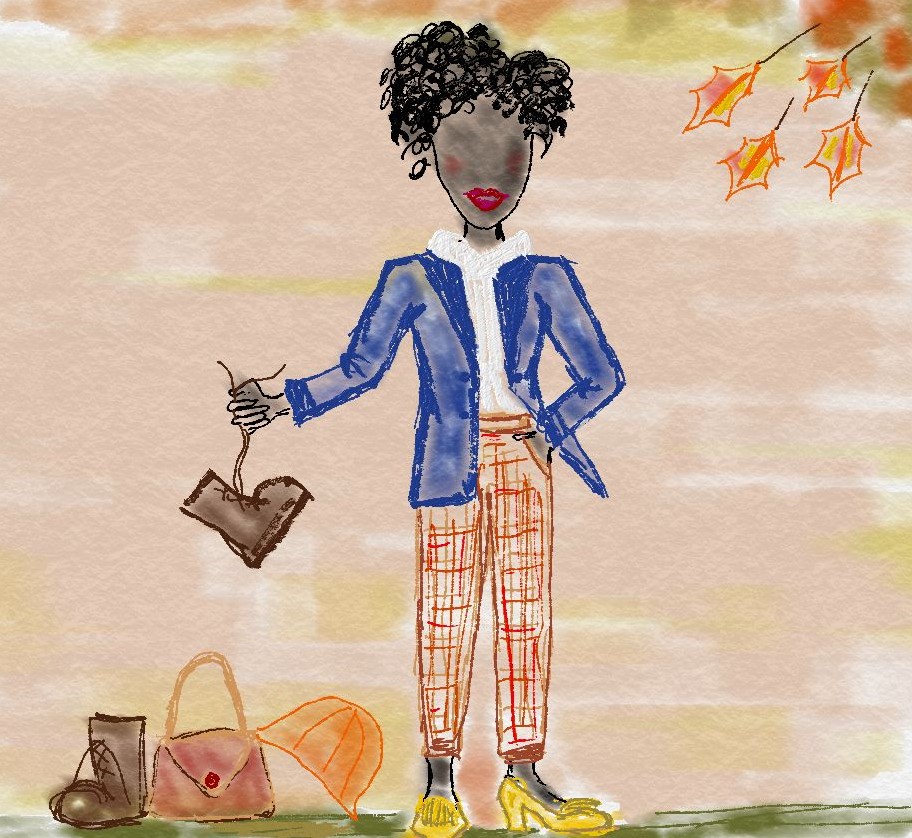
What’s on Your List?
Last month I was on a jobsite, talking to a guy about the sad fact that most TV shows and movies had stopped production because of the pandemic. We reminisced about some of the big movies that were released last year, and then he said it. “I was so disappointed in the last Star Wars movie.” Ugh.
If you’ve been in this space for more than 13 seconds, you know that I loved that movie. So, I knew I was being masochistic, but I couldn’t stop myself from asking, “Why didn’t you like it?” I should have spared myself the agony.
He proceeded to tell me that he resented the fact that “they threw in some people just for diversity’s sake,” and that the main character, Rey, was “just too….well, she should’ve been more like Natalie Portman when she was in the Star Wars movies. Pretty, not trying to act like a guy.” He went on to say it should have been more like the movies from the 70s and 80s. Give me bonus points – I didn’t punch him, and I gave him a polite smile. If you know me, you would have recognized the smile as the kind I give Kentucky fans when I’m thinking of running them over while they’re walking in front of my car.
Here’s the really sad fact about this conversation: I had heard the same opinion from two other guys. One was someone I knew, and one was a movie critic.
Can we discuss the absurdity of complaining about diversity when the original movies that were supposedly the ideal specimens for these guys were peopled heavily with, well…not people. Giant hairy Wookies, cute cuddly Ewoks, not to mention entire bars full of things I can’t even name. Admiral Ackbar had flippers and whiskers, for heaven’s sake. But throw in a few people of color and whoa! We’ve just gone crazy and gotten unrealistic.
Criticism of Rey stems from the fact that she battles her inner demons and saves the world like the man typically does in most movies. I don’t mean just Star Wars movies. I mean all movies. Even though Princess Leia had power in the original movies, she had a pure moral center, and her brother got all of the angsty hero screen time. She was a good girl and she wore a dress.
The truly revealing aspect of the criticism I heard was that the three guys who made the negative statements all had similar characteristics. All three are mid to late 30s, white, and of middle class backgrounds. I believe these similarities explain a lot about their viewpoints.
Most people equate safety and security with how conditions were when they were young. People routinely believe that the world is a scarier place now than “before,” but the truth is that it’s scary now because they’re now old enough to be aware of all of the dangers in the world. And they’re now in charge of at least part of how safe the world is – their families, their belongings, whatever. Most people subconsciously see change as unstable. Ironically, the only thing that is constant in the world is change, so people fix a certain point in time as their benchmark and see everything from that point forward as different and possibly dangerous or unstable. Star Wars of their youth reflected how the world was at the time.
Add to this perspective the fact that men, particularly men who have grown up white in the United States, have had the benefit of knowing that their wants, needs, and cultural accoutrements constitute the mainstream. They see the concerns and interests of women as secondary. As a boss of mine once said, “Can you imagine if women were in charge? All the newspapers would print would be stories about dresses and babies.” We all know that cultural characteristics of minorities in this country also are treated as ethnic items with narrow audiences. As such, Bob from Columbus would see a shiny red Corvette as something that everyone should want, but he would view a tricked out El Dorado with rims and ground effects lighting as something tacky that “those people” would have to cruise around the projects.
So the guys with the Star Wars criticism were viewing the elements of the movie as not just change in Star Wars land, but changes in their own world. And those changes might be scary. What if the interests and needs of men, mainly white men, were no longer considered above everyone else? What might happen to the world???
I say this in a rather harsh manner, but I actually have a lot of friends and loved ones who are men, including a lot of white men. (If we’re talking about my family, really really white men. Almost translucent). They are good people and not necessarily racist or sexist or horrible trash. At least not knowingly. I think this worry about change reflects the same worry most people have when faced with a different world than the one where they were comfortable, where they knew their place. These guys just happen to be sitting in the catbird seat, and they see it slipping away.
I am sympathetic to the guys who don’t realize that their preference for “the right way” is actually just a preference for comfort and control. We all want that, right? On the other hand, I started thinking about what the world would be like if the preferences of men did not dictate the ways of society, and the world could be like it is when I’m comfortable and happy. WAIT A MINUTE – THIS COULD BE GOOD. There are some things that I just get completely sick of that are the province of men, and some that are mostly popular because of white men. Could we get rid of them if we all get equality? Okay, not get rid of them, but push them into the region of small cultural niches where many of my likes currently reside? The thought was delightful. I started a list.
I had a lot of fun making my list, and I’ll share it with you. Keep in mind – this is MY list. Don’t contact me and tell me that you actually like #6, and you’re a woman. Or don’t call to tell me that men of color like most of the things on the list. This is my fantasy list in my fantasy world where Manolo Blahniks get more attention than golf clubs. In my world, there would be less fascination with marching around the world killing other people and more interest in dance-offs. You might envision a world in which there weren’t “restaurants” with burgers made of fillers on every block and instead people could get arroz con pollo on every street corner. You might wish that movies weren’t made where obnoxious, out of shape guys get the gorgeous girls and instead the curvy girl with blue-black skin and Bantu knots has her choice of all the hot guys. I suggest you make your own list. Mine made me really happy.
So I’ll share it with you. Here are all of the things I would strike down to niche status just because I don’t like them, and I get sick of them dominating our world. That’s how society should be, right? Whoever is in charge gets all the marbles? Add whatever you like.
- War movies
- Khakis with pleats
- The air guitar skills of anyone over the age of 16
- Polo shirts
- Mullets (No, they’re not gone. I worked with a guy sporting a 1985 classic last week).
- Books about Civil War battles (and Civil war weapons and that weird ironclad Civil War submarine)
- Baseball
- Golf pants
- Four wheelers
- Speed boats
- The Three Stooges
- The University of Kentucky
- Excessive lawn maintenance
- White socks with dark sandals
- Cigars
- Homebuilders who wear khaki Bermuda shorts and never get dirty and just talk on their cell phones all day and knock off early (okay, very specific, but like locusts)
- Grilling out as an art form (It’s a flame and some meat. You’re not a genius).
- Preaching about vehicle maintenance
(Note: This list was made in fun. If you think I hate men or I’m anti-white men, you don’t know me, and you didn’t get it. I’m running for President in 2024 on a platform of increased funding for good quality riding boots and an emphasis on floral education).
He sounds like he’s on the right track – we trust you to keep him there!
My son told me he likes Rey because “she reminds me of you, mom!”, so there is hope for the…
Well done! So snappy and upbeat. I’m proud to know a few awesome geotechs in the video!
Love it! I’m hearing lots of great feedback!
In the Spotlight
What Exactly Do We Do?

Big news!!! We are so proud to have participated in making the new video produced by the Women in Deep Foundations Committee of the Deep Foundations Institute that addresses the question, “What in the world do those geotechnical people do?” Please take a look, share, send it to little girls you know, show it to your Girl Scout troop – you could even set up a screen in your backyard and invite all of your neighbors for a showing. That little girl who cuts your grass might get some great ideas about a future career where she can still get dirty and no one will yell at her about it.
P.S. You’ll probably see some fabulous faces you know!
A Head Start
Anger We Know, Pain We Don’t
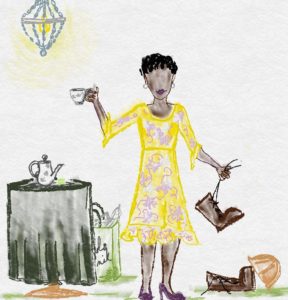
A few years ago, a friend talked me into online dating. I successfully had resisted getting sucked into this activity for a long time, not because I disapprove or think it doesn’t work, but because it is in direct opposition to what I need and want from a relationship. I hate being close-minded, though, so I caved.
The next month would have been comical if I didn’t have so little free time. There was the guy who admitted he had no friends and spent most of his time hating his ex. There was the guy who thought it would be “chill” to “hang” with me with his buddies because I knew the difference between a first down and a safety. There was also the guy who proposed on the second date and texted me for over eight months despite the fact that I never responded to a single message after telling him that I wasn’t the face inside a heart outline on the Hallmark card of his life.
I stopped responding to any of the would-be suitors, (particularly the guy who collected spiders), but was too busy to go through the arduous process of shutting down the account. One exhausting day, I was cleaning out the collection of e-mails I had gotten over the last week or so from the dating site, and one message caught my eye. The guy in the photo had a captain’s hat perched on his head at an angle. Sure enough, his profile identified him as living in a run-down area on the other side of the river where a motley collection of not-even-close-to-yachts were docked. His message read, “Hey – what are you doing tonight? Are you up to something or are you just sitting around bored with nothing to do? I can fix that.”
I was incensed. Not just repelled by someone to whom I wasn’t attracted, but furious in a way that was way out of proportion to a stupid little dating request. I’m not in the habit of looking down on people, even when it’s someone who is beyond not my type. And it wasn’t the first time a guy I didn’t particularly care about asked me out, because I’m old and I’ve met a lot of guys over the years.
My anger was deep and volatile, and it manifested itself into an outrage that even I wasn’t expecting. It wasn’t just the fact that I’ve never been bored in my life, and his invitation suggested I was uninteresting and couldn’t come up with something to do. My visceral and sustained reaction came from the fact that he assumed that because I was a woman, I needed him to get something done, even if that something was just having fun. My poor little life was incomplete and boring, but he, (a man), could fix that just because he was a man.
I was angry at this man for the same reason I’ve bristled every time an old guy on a jobsite was just sure that I wasn’t maintaining my vehicle properly just because I was female. “I’ll bet you don’t remember the last time you got your oil changed.” It should have been funny. Instead, the top of my head blew off, and I had to walk away. Every time.
I was angry at this man for the same reason I still can’t look at a certain neighbor who came into my front yard one day and tried to tell me how I should take care of drainage on my property. “I know you’re an engineer, but…” This man knows nothing about drainage, but in his mind he knows more than me because he’s a man. I couldn’t possibly handle my property if he weren’t there to give me his wisdom because I’m a woman and I live alone.
As much as I make light of this at cocktail parties and laugh at outrageous stories, I hate the feeling of being dismissed. I hate being underestimated. I hate knowing that a large sector of the population automatically thinks the list of things I can’t do is extensive and that my fluffy little brain is too flighty and delicate to understand the importance of tire pressure and transmission fluid.
I’ve thought a lot about my anger during the past few weeks. As much progress as women have made in the past 20 years, the guys in the jaunty captains’ hats are still out there. But as infuriating as it is to feel dismissed, no one has ever looked at me negatively because they thought I was dangerous. No one has ever decided that my presence could be detrimental to the moral and economic fiber of a community. I may have been asked in the past what man was going to guarantee my mortgage, but no one has ever eliminated me from consideration for living somewhere because I was undesirable.
There is a difference between being dismissed and being pushed out. Black Americans know all too well what it feels like to be pushed out. Despite my own anger, I can’t imagine what it feels like to be actively distrusted and treated as a hazard, a danger to “good people.” My life has never been in danger just because of how I look. I may be frustrated, but there is little chance I will be physically harmed just for showing up. I know what it is to be overlooked and underestimated, but I don’t know the heartbreak of being hated every day for how I was born. Black men are killed because small-minded people believe that their sad little lives will be more secure if they can direct their anger and frustrations at a physical target who history has shown society won’t defend. Tragically, black women are burdened with racist hatred AND every woman’s handicap of being dismissed. As exhausted as I often become when dealing with sexism, I do not know how black women get out of bed every day with such enormous weight on their shoulders. If I am furious, their anger must be enormous.
When I was running cross country in high school, one of my teammates and I were out training on the road one day. She happened to be black. A pickup truck suddenly screeched to a stop in front of us, and we were pelted with rocks and rotten fruit. The truck sped away as the driver screamed ugly names at us and the passenger unfurled a Confederate flag with the KKK logo in the middle.
I was livid, and my dad was even angrier when I got home that night. “You two need to run in the exact same place tomorrow to show them that their racism won’t win,” he said. We did. The Klan members didn’t show up again, and we celebrated what we thought of as a victory.
What I didn’t consider at the time was the fact that my friend might not have gotten off so easily if she hadn’t been with a white girl. That rebellious inclination to get right back out there might have been possible because there was a much lower chance that something serious would happen to me. The difference between a serious attack and some drama during our run was my white privilege. The difference between me deciding to go “make a stand” and being a person who has known to be careful her whole life for fear of actually being injured was my white privilege. I knew I had an advantage then, because my parents were anti-racists, even when such a thing was scarce. But it has taken a lot of mileage for me to truly understand the head start I was given in life just by being white. It’s not fair, and it’s an advantage no one should have.
Here at Underpinnings, the pursuit of equal treatment for women is just one branch of our overall quest for equal treatment for everyone. To seek equality just in terms of gender would be ludicrous for a person who truly believes in a fair and just society. As with any project, the first step is to determine the most imminent danger and address it accordingly. People being demeaned, degraded, and marginalized is an important problem. People being killed is a critical problem. I’m trying to do everything I can to take action where the problem is critical and do more internal evaluation where the situation is more subtle. I will never be black, so I will never fully understand the experience of being the subject of hate just because my skin is dark. But I do know what it feels like to be dismissed and overlooked just because of the way I was born, and I don’t like it. I don’t want anyone to feel this way or worse, and I think now is not the time to be divided by our supposed weaknesses but to be united by them. This is an ugly, complicated, messy problem, but that just means we have to work harder to fix it.
Checking Out
The Top of the Hill Is in Sight

Don’t say this out loud, because we don’t want to jinx it, but it looks like we might be starting to, maybe, sort of, in a subtle way, approach the outer edge of the zone that’s right before the stage that leads eventually, circuitously, to the end of the tunnel. Notice I didn’t say anything about seeing a light? And also notice that I didn’t describe this status in any definitive or affirmative way? Hey – I’m an engineer, after all. They train us to manage expectations.
So, at the backs of our minds somewhere, behind the piles of toilet paper and the new recipes for sourdough bread, we’re toying with the idea that someday before the turn of the next century we might be emerging from our houses and apartments and barns or wherever we have been sequestered for the past 632 weeks. Not all at once. Certainly not. If you think there will be a day on the calendar where all of a sudden everything will go back to normal, I’m afraid your biscuit isn’t quite done in the middle. No, our release back into the wild will be slow and controlled and fraught with danger. We know that we’ll never, ever, ever be touching other human beings again, but we might actually get to see some.
The question here is: can we make some hay out of this possibility of sunshine? As proactive professional women, we’re always looking for chances to get ahead, to make life better. Are there any opportunities here?
When I was running cross-country, I had a coach who liked to run us through “check out” drills. He theorized that the average runner would experience a slight moment of relief right when she would get to the top of a hill. This slight pause, however small, would give a competitor a chance to capitalize on the situation and make up ground by doing the opposite and accelerating. We spent endless hours running to the tops of hills and accelerating right as we got over the crest.
I give my old coach a lot of credit – the technique worked every time. If I had runners in front of me or near me, I usually could pick off at least a couple of people as we all reached the top of a hill.
There is no doubt the world will be breathing a sigh of relief in staggered phases as countries reach conditions where some parts of society can be restarted. Similarly, your co-workers, clients, and competition will be happily settling back into their (child free!) offices and jobsites. A short “honeymoon” period of a few weeks is to be expected while people see each other again and luxuriate in the routines they didn’t know they loved.
This is the top of the hill. It doesn’t matter that we’re not physically there yet. If you can see it, or even envision it, you need to be thinking about checking out.
So what does that mean for you? It can mean a lot of different things, depending on your position.
If you are an employee, particularly an entry-level person, you need to do some investigating and observing to figure out what avenues you might have for advancement. Your employer most probably has been tap dancing on an unfamiliar dance floor for the past six weeks, trying to figure out how to keep work going, keep paying employees, and keep clients happy. What have been the biggest needs? Not your biggest needs – your employer’s. What has been the biggest stumbling block internally? Has it been communication? Have you had trouble getting feedback from clients who are also navigating seas inhabited by heretofore unknown monsters? What can you do to help with this? Remember, your goal is not to figure out how to make your life better. Your goal is to figure out how you can be a valuable employee at a time when your employer likely is tearing out her hair. Volunteer to do something you’ve never done before. Offer to brainstorm about ways to solve problems. As my dad used to say to us when something needed to be done around the house, make yourself useful.
A very smart lady once told me that you don’t understand someone’s character when life is good. You get a sense for who someone really is when things are bad. She was absolutely right, and the same philosophy applies to employees. Don’t be the person whining about how the project you were excited about just got postponed and now you’re going to have to work on something boring. Be the person who volunteers to call clients and ask what your company can do for them in this tough time. Be the star who formulates a revolutionary new way to facilitate in-house communication and actually has the nerve to submit it to her boss.
The same can be said for people who own their own businesses. This is the time to call clients and offer help…or a shoulder to commiserate on (socially distant, of course)…or just some time to listen to how completely screwed up their project has become during the pandemic. Put yourself in front of people and let them know that your problems aren’t getting in the way of being an indispensable resource. Check out.
I hope a number of you are getting excited as you read this. We’ve had a lot of darkness for quite some time, and this might be a little bit of light in your life. On the other hand, it’s critical that we acknowledge that another sector of our group might be reading this with the exact opposite reaction. “Seriously? Are you kidding me? I am barely surviving right now, and you want me to be ambitious and proactive? I just did three conference calls with a toddler on my lap, and I have to feed five people in the next hour AND I’M EXHAUSTED. Do you really want me to do more?”
Actually, I don’t. Let’s be honest – everyone has lived through this nightmare in different circumstances. If you have been working at home while homeschooling your kids and taking groceries to at-risk relatives, you’re a hero. Take a nap when this is done and think about your colleagues who are checking out as you drift off to sleep. If you are exhausted from riding the subway with a mask on while trying to stay distant from idiots on your way to your jobsite every day, you need to appreciate the fact that you made it through this without getting sick and without killing anyone. Applaud your friends who live in wide open spaces who are going to strategize on how to use this situation to take a step forward. Despite the fact that some of us want to optimize every possible opportunity and participate in everything all the time, that’s not real life. You are human. It’s time to take a break. Don’t check out.
If you are sheltering in place with a bunch of little ones (or even medium ones), you have had the honor and sacred responsibility of keeping them safe during a disaster. And you did it. That’s as good as crushing a micropile design, trust me. You might not see it that way from your perspective on the ground now, but 20 years in the future you’ll appreciate what you did. (And you’ll be sure to tell your kids how easy they have it as parents). In the meantime, you can cheer on your fellow female professionals who will be making progress for all of us.
So think about checking out, if circumstances apply. If they don’t, please support those who can. Sometimes we have to pass up opportunities, but we can be happy knowing that our sisters are out there, making phenomenal strides in our places.
No Action
Fighting by Doing Nothing
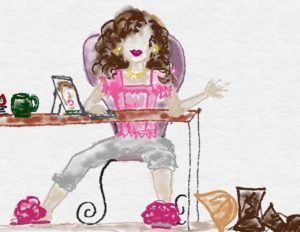
So. Here we are. How should I write an introduction for a post in a time when our situation changes every day? And how do I know what you need when you read this? Do you want humor to take your mind off the horror of today and the uncertainty of tomorrow? Or do you want serious advice on how to handle this new environment?
Let’s start with the advice. I have none. One of the most challenging aspects of the COVID-19 pandemic is the fact that every person and every household are dealing with a completely different set of circumstances. You could be living in a house with six other people, including an infant and a toddler, but out West, situated far from others. Your fears of getting sick are low, but your problems with getting baby wipes and groceries are high. Or you could be living alone in a New York City apartment, scared to death of getting sick and having no available healthcare, but close to plenty of food in a nearby market. Or you might have few supply and health issues, but you just got laid off from your job. The issues and stresses in each of these situations are different and require unique solutions – no general advice will do.
I have lots of humor, which sometimes I need desperately, and sometimes seems horribly inappropriate. My friend just gave me toilet paper for my birthday, and I WAS GRATEFUL. My Depression-era grandparents no doubt are looking down and smiling smugly. “Don’t you wish you had spent more time listening to our stories about how to make spaghetti and meatballs out of nuts and grass from the back yard?!”
I could tell you warm and fuzzy things about all of us being in this together. But I’m sure you maxed out on inspirational sayings on Instagram some time last week. In all honesty, it would be something of a relief if someone weren’t in this with us. Then someone could rescue us, right?
Perhaps it would be helpful to acknowledge the specific frustrations of our little skirts-in-dirt corner of the world. Do we have our own set of issues? Of course we do.
If you are a woman in our field, you are not passive. You haven’t waded through low expectations and condescending looks to succeed as an engineer/contractor/etc. by sitting by and waiting for other people to make decisions and act. You’re a problem-solver by nature, and the barriers to our gender in the professional world mean that you are used to powering through ugly situations to make things happen. But the constant in all of these statements is action. And taking action is the one thing you can’t do right now.
Right now, the sky is blue, and spring is here (at least in the U.S.). There are no bombs dropping from the sky to threaten our homes. Soldiers aren’t marching down our streets. We are not underwater in a flood, and hurricane season isn’t here (yet). If you drive down the street, you see families out playing and talking, people running, and spring flowers sprouting up in yards. You would have to know what to look for to see that none of the kids are playing with other families, and people on the sidewalks give each other a wide berth. Parents are smiling but drinking heavily because they’re spending their days as unqualified home-school teachers who are hoping they don’t ruin (or kill) their kids.
So we’ve all been confined to our homes because there’s something awful and ugly out there and we have to make sure it doesn’t kill us. But we can’t go out and fight it. We can’t organize a supply chain to the front lines. We can’t take up arms and wipe it out. In short, we can’t do what we do well.
If you watch the HBO drama Game of Thrones, you probably saw the battle with the Night King’s army last spring. In the episode before the battle, the story examined each character as they waited for the army’s arrival. That was the entire episode. In my opinion, it was one of the best installments in the show’s long run. Every character waited and thought about what was to come and hoped that he or she was up to the challenge. It was terrifying. It really brought home the fear that we all feel when bracing ourselves for an attack we know is coming but with details and outcomes we can’t predict.
This quarantine that we’re all inhabiting reminds me of that episode, but without the battle. We can’t take up a dagger of dragon glass and try to resist the advancing hoards. Instead, we have to stay at home and wash our groceries. We can’t board a dragon and wipe out enemy troops. Our battle must be fought by NOT advancing and NOT collaborating and NOT trying to wipe out the enemy. It’s not an approach that most of us adopt very often, and we’re uncomfortable. We’re also tense and tired and scared.
I have likened the spread of the coronavirus to the problem you have when you spill glitter in your house or when someone breaks a glass in a crowded party. “Everyone stand still and don’t move!” You know that someone will get cut no matter how much you order them to stay put, and glitter always disperses as if by magic. We are trying to stand still, to keep from spreading glitter to every surface and person we will encounter for all eternity. If you have daughters, you know the futility of trying to contain the glitter. No matter how much you clean, you find it on the undersides of your car floor mats 6 months after your toddler spilled it in her toy room inside the house. Unfortunately, this is glitter that will kill your toddler’s aging grandparents. We can clean and clean, but then our only course of action is to STAY STILL. How on earth do we start doing that now after we’ve spent our entire lives trying to save the world through perpetual motion?
If nothing else, we have a solid community in our foundations world. We can call each other and lament our feelings of powerlessness. We can video chat with glasses of wine and hope that our home-schooling efforts aren’t producing a generation of bad spellers who can’t do math. We can reassure each other that this is just another challenge with unusual parameters. If there is something we do well, it’s handle unusual challenges.
Most importantly, we can re-calibrate our view of the world to fit our current reality. I think every person’s survival in this crisis and afterwards will depend on resetting our expectations. If we change our mindsets to look at this problem as a project instead of an inconvenient and scary departure from normal life, we are as qualified as any group of people to crush it. If nothing else, rearranging our perspective might at least give us some peace of mind. This is just another project challenge for another day. And hey – it doesn’t discriminate by gender. There’s a silver lining to get you started.
Because You Can
We Need a Little Happy
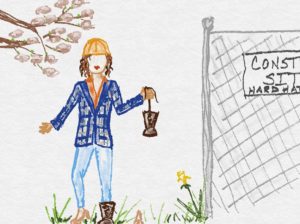
Oh. My. Heavens. Is the world trying to put us in a bad mood? Have you had a few dark weeks lately? Apparently the coronavirus is going to kill us all, and even if it doesn’t the news media is going to scare us into canceling all events and not leaving our homes for weeks. (As tempting as that seems…) And the elections are just a bit much. Every time you turn on the news or click on a story, people are yelling. They’re yelling at each other, they’re yelling at crowds, they’re yelling at us. Could someone please tell the candidates that every event is not a pep rally? Seriously – I will vote for the first person who simply speaks in his/her inside voice for two straight days.
(Update: This post was written and scheduled before the public health crisis grew to its current proportions. The mandates to stay home are warranted, and no parade or basketball tournament is worth losing the life of someone you love).
So, as you’re sitting on that tiny plane next to a coughing man who’s wearing a Straight Outta Wuhan T-shirt and the inflight video is a replay of the Democratic debates, I thought perhaps we all could use some happiness. I promise not to yell.
In the geo-related business, we all have an everyday awareness of geologic time. Geologic time is that great ruler by which we express how insignificant many things are. If geologic time were a day, people would have existed only in the last second – you’ve heard this sort of analogy, right? We talk to clients about the fact that this “new” sinkhole has been developing for millions of years. We tell our kids things like, “You think I’m old? Let me go out to my truck and get you some samples of Devonian shale. Now that’s old!” We are nerds, and it puts things into perspective when we think about how long the materials we’re exploring have been around.
I would like to use a similar relationship to tell you all why we should be celebrating today. Bear with me.
People(ish) appeared on this planet about 5 million years ago, give or take a few million years. Homo sapiens evolved over 50,000 years ago. According to the most recent calculations of people who do that sort of thing, our current population is approximately 7% of all the people who have ever lived. So about 94 billion people lived before us. If 51% of those people were women, that means almost 48 billion women came before us. Using some completely sketchy and non-anthropological assumptions, we’re going to estimate that at least 90% of those women lived in a patriarchal society, because women are smaller than men and brute force ruled the day. So 43.2 billion women lived before us in male-dominated environments. I think you would be safe to say that of the 3.8 billion women living on Earth today, at least 30% of them still live in completely oppressive conditions. So in summary, (which is likely several decimal places off), the women in today’s progressive cultures represent only about 6% of all the women who have ever lived.
We spend a lot of time talking about the problems that still face us in our male-dominated workplaces, but, seriously – 6%!!! Of all of the women who have ever lived, 94% of them had it a LOT worse than we do. They couldn’t own property. They couldn’t vote. They could be raped or beaten, and it didn’t have legal consequences. If they were raped before they got married, their futures were ruined through no fault of their own. They were traded for power and disregarded. They had no legal worth.
But we do!!! We can vote. We have jobs that we want. We can own our own houses. If we are attacked or even sexually harassed, we are able to press charges and seek damages and justice. We can decide not to have children and we won’t be at risk for being tossed out into the streets as worthless. We can have credit cards and stock portfolios and bank accounts, and no man has to oversee all of this.
Can we take a minute to celebrate this? Yes, things might be much better in the future, but they were much much worse for a good portion of a past that is much longer than our short memories. And WE get to be here for it. Our grandmothers couldn’t open their own credit cards, but we’re allowed to charge enough shoes to max out our credit limits. And we don’t have to have anyone else around to monitor our spending habits. Our great grandmothers could lose their houses if their husbands died, but we can live out our days lounging on our fabulous wrought iron furniture in our fabulous parterre gardens next to our fabulous country houses bought from our earnings from our fabulous jobs.
We need some happiness right now, so I want to initiate a little campaign to honor what we have. I am proposing that we all do the following (choose all that apply):
1- Charge something (because you can). It doesn’t have to be from the spring line of Manolo Blahnik, although we’ll all bow down to you if it is. You can buy $3 lip balm to give to your preteen daughter. Or you can buy a copy of Garden and Gun magazine to enjoy with your morning coffee.
2- Sit for 10 minutes and study the platforms of the presidential candidates, because you get to VOTE! You may end up doing a write-in for Sarah Jessica Parker so that we get Universal Footwear, but you can still honor the fact that you get to be part of the process.
3- Take a photo of part of your house or apartment or condo to commemorate the fact that it is legal for you to rent or own property.
4- Take a photo of your office or save a business card to memorialize the fact that you were able to have the job you wanted. You might hate your current boss, and there’s a possibility that you’re going to poison all of your co-workers during the next lunch-and-learn, but there’s no law that says a woman can’t be a insert your job here. There’s also no law that says that you can’t leave this job and get another one. In fact, you can change your profession completely if you want.
For each of these items, I want you to do them in honor of a female ancestor or ancestors who didn’t have these rights. We all have these ancestors. My great-grandmother Evelyn, my great-grandmother Margaret, my great-aunt Freda…the list goes on. I have it better than all of them, and I don’t appreciate it enough.
A moment of silence and a smile will be enough to commemorate these moments. If you’re into social media, put up a post with #notonestepback*. (Feel free to tag me on Instagram – @peggyhagertyduffy. You can also tag me or Helen on Facebook). That’s the order Joseph Stalin gave his troops in 1942 when the Russians were being invaded by German soldiers. We need to hold the same hard line. Now is the time to be happy about what we have, because there are plenty of dark forces trying to bring the world down. We’re stronger than that. We’re going to honor what it took to get here, and we’re not going back.
*Note – For you diehard history people, use of this slogan does not mean we’re going to execute retreating troops. No one will be shot. We just liked the decisive spirit of the order.
Beyond an Epidemic
Good Enough

A few weeks ago, I came across this blog post (click to follow the link) and my response was a resounding “Yes!” Yes to the idea that we should be happy with accomplishments first for ourselves. Yes to less looking to others for affirmation. In my mind, the post was all about stopping ourselves from constantly asking, “Was that good enough? Did I do what I was supposed to do? Was that enough to prove my worth?”
So, I wrote a post about this for Underpinnings, and I sent it to Helen for her expert editorial review. She responded with, “Can we talk about this?” I speak fluent Helen, so I said, “So, you hated it.” This led to an animated discussion that revealed that I had not done a good job expressing myself. I hadn’t really said what I wanted to say, and I realized that some of my poor communication stemmed from the fact that I had not fully worked out how I felt about this issue. Was I objecting to praise? No, not really. I did feel like that often praise for women in our field has a bit of a well-that’s-great-no-one-expected-you-to-do-well-because-you’re-a-girl feel to it. But that wasn’t really the crux of it. Of course I believe in praise – just ask my stepdaughter. She used to say, “I know, I appreciate it, but you always think we can do anything well.” So why did this pitch for looking for your own praise first resonate with me so strongly?
As I was trying to figure this out (in order to write a post that actually made sense), I got a phone call saying that a young relative very close to me had tried to commit suicide. A phone call like this never makes sense. How could it? How could a young teenager have experienced enough to decide that nothing here would make it worthwhile to stick around? This is an individual with friends and hobbies who is consistently at the top of her class. How does this compute? It doesn’t. And sadly, as I bawled to my always-supportive friends, many told me that they knew of other young women in the same age bracket right now who were battling depression and anxiety. No coronavirus can be held accountable for this epidemic, and the casualties are certainly much higher. How did we get here?
My original rumination on the nature of our need for praise seems to have some place in this discussion. Until a hundred years or so ago, the everyday tasks and responsibilities of most women did not involve opportunities for praise. Beyond accolades for a well-cooked dinner (if they were lucky) or congratulations on birthing a strong child (without dying in the process), women were relegated to the world of servitude, and servants don’t get praise. A good servant is someone who follows the rules and doesn’t get reprimanded. Actually, for most of the world’s population, men included, daily life was too full of tasks necessary just to survive to get much praise. “Nice job keeping us alive through the winter,” probably wasn’t a compliment doled out too frequently, even if it was valid.
As the business of staying alive through modern conveniences allowed people to engage in pursuits where praise might be more appropriate on a regular basis, women still were stuck in a narrow aisle of domestic pursuits. But the modern conveniences gave them the opportunity to excel, not just survive. The many “women’s magazines” that arose during the twentieth century attested to the fact that women were striving for some sort of achievement. Here’s a fabulous Jell-O mold – did I do that well? Look how clean my kids’ clothes are – am I a great mom? Here’s a cocktail I invented for my husband for the end of his workday – am I smart? Even though women were making advances in equality, they did it within the framework of proving their worth. They had to. Because the law had said for hundreds of years that they didn’t have any worth. So they were going to prove themselves within the categories they were allowed to inhabit. The women striving for achievement outside the sanctioned areas were considered to be dangerous influences and reckless rebels.
The problem with the structure of affirmation was that the implications of many preceding years was built into the approvals. You can be commended for having well-behaved children who wear perfectly ironed clothes because it means you’re staying in your lane. The stronger the praise given, the more other women would want to strive for the same goals. So the system reinforced the original scheme of oppression while seemingly giving women more opportunities to succeed.
And we bought into it. In our enthusiasm for being betterstrongerfaster, we devoured the magazines and videos telling us how to be prettier, how to get thinner, how to do better in school, how to have a more fabulously decorated house. We got competitive within the lane we had been given without realizing we were reinforcing the outside lines.
In the past 40 years, more and more women have decided that the lanes are too narrow. We have widened our selection of acceptable careers and we have tried to normalize workplaces that are equal. We’ve even been able to change the accepted standards of beauty that were unrealistic and discriminatory towards all women except four or five anomalous girls who were blessed with freakishly fantastic genes. But we have not been able to shake our drive to prove ourselves. We’re still looking for an atta girl, a confirmation that we did a good job and we deserve to be….wherever we are. Why? Men obviously don’t do this. Have you visited the Men’s Interest magazine section in your local bookstore? The headlines imply, “You’re already crushing it – here’s a way to have an even better time while you’re conquering the world.”
I’m afraid we have successfully changed the professional landscape for women everywhere without addressing the entrenched social expectations and behavioral patterns that have been drilled into females for thousands of years. I refuse to believe that the current rash of depressed teenagers is solely a product of social media. That’s an answer that’s too easy. Yes, social media creates a whole mess of complications when dealing with the normal horror show that is adolescence for most people. But we have to address the foundation we are providing for kids, particularly girls, who are living in a world that is vastly different for their gender than it was 100 years ago. How do we break out of this infinite loop of quest for achievement and praise to define worth? How do we let girls know that success does not come from being a blue-ribbon rule follower, because many of the rules are sexist crap? How do we turn all of our progress over the past century into real opportunity rather than just a wider array of roles in which we wear ourselves out saying, “Was that good? Am I good enough?” It’s 2020 – our girls should not be chained to the same debilitating expectations that have limited the women before us.
Special Gifts
Inspiration is a Great Gift Idea
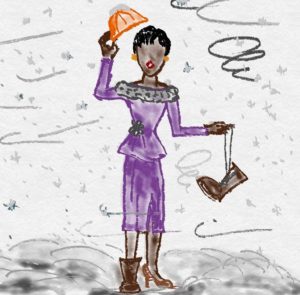
I count the last part of 2019 as a time in which we received a bounty of gifts to renew our hope in making the workplace equal for men and women. I’m not talking about anything related to #MeToo or TimesUp. These gifts were outstanding women setting fabulous examples for the rest of us. Did you notice? If not, allow me to elaborate.
In mid-November, I got into my car one day and turned on the radio. If I had known the impeachment hearings were being broadcast live, I probably would have switched to the classical music station. I hate to admit that, because I’m constantly torn, feeling like I have a responsibility as a citizen to know what’s going on. But – ugh. Just ugh. The unending bickering between self-absorbed people who are only interested in keeping their own jobs is just exhausting. If these narcissistic politicians who dominate the microphones actually cared about the country, the situation would be completely different, but here we are.
So, I flipped on the radio and was immediately met with the carefully modulated tones of Marie Yovanovitch. The former Ambassador to Ukraine and longtime Foreign Service member was in the middle of her opening remarks, and I was mesmerized. She articulately described her long work history, a resume that included multiple incidents where she had to flee a location under gunfire. Her words and demeanor made it clear that she was a consummate professional and that she did what she did because she believes in our country. Her commitment to protecting and advancing the U.S. through sound foreign policy was obvious.
As members of Congress began to question Dr. Yovanovitch, the subject of her dismissal from her diplomatic position by the President of the U.S. arose. Multiple persons brought up the fact that the President said negative things about her to representatives of other countries, and he had put out ugly tweets about her during the hearings. She went to respond to this subject – the subject of the abrupt end of her sterling career – and I heard her voice start to waver. As she became obviously emotional, I instantly yelled, “Nonononono!” at the radio. You CAN’T get emotional when you’re confronted if you’re a woman. We all know that, don’t we? They’ll use it against you, whomever they happen to be. Don’t show that you care. Never show weakness.
But Dr. Yovanovitch went on in the same manner, and the effects were simply, unexpectedly wonderful. Most of the hearing participants already were blatantly hesitant to say anything negative to someone with such an admirable background. Her display of emotion just brought it home. Instead of going in for the kill, the questioners appeared to realize just how tragic the situation was and how much Dr. Yovanovitch had given for the country they were supposedly trying to save with their hearings and fighting and grandstanding. Her emotion was absolutely appropriate and served to prove the depth of the commitment she had already described.
I learned something in that moment. Yes, we still have to be careful about making sure ignorant men in the workplace don’t perceive us as “emotional.” But we can’t let that keep us from expressing true emotions, particularly when they are well-placed and help people to understand our positions and beliefs. Through her example, Dr. Yovanovitch proved something to the women of this country – you don’t have to hide your emotions and pretend like you don’t care to be taken seriously.
A few days after Marie Yovanovitch testified, I again unwittingly turned on the radio during the impeachment hearings. This time, former National Security Council member Fiona Hill gripped my attention from her first sentence. She was in the process of clarifying that, in case anyone was still misunderstanding, Ukraine did not interfere with the 2016 election, Russia did. She didn’t hedge her statements or keep them general enough to cover potential gray areas. In effect, she said, “Look, you idiots. Russia interfered in our election in 2016 and they are on track to do it again in 2020. This is not in question, and if you don’t get your heads out of your asses you’ll pay the price.” It was FABULOUS. She did not care if someone thought she sounded “too masculine” or if she might be perceived as a bitch. She had plenty of experience to know what she was doing, and she had the data to back up her beliefs. She was doing her job. Let me repeat that – she was doing her job. The strength of her convictions and her own knowledge were sufficient weapons to let her do what she needed to do without worrying about what anyone thought about her delivery or her qualifications. As someone I know said, “That woman is a badass.”
As the questioning continued, Dr. Hill did something that gave me a chill. She addressed a situation in which she was wrong. She stated that she was wrong, and she explained why she had drawn erroneous conclusions. She didn’t over-apologize, and she didn’t take the entire blame for everything that had ever happened to the world. She explained and moved on. I was in awe.
Again, I learned something. At some point you have to forget about “leaning in” and “seizing your power” and “being sensitive to others’ preconceptions.” Sometimes you have to just do your job. If you’re doing it right, and your eye is on the task at hand, all of the rest of the socio-political crap will be unimportant. And if you make a mistake, own it, explain it, and move on. Don’t give your detractors more ammunition by making too much of your mistakes.
The last ray of inspiration came in a dark movie theater in December watching “The Rise of Skywalker.” I should mention that I was a huge Star Wars fan as a kid, and I related to the fact that Princess Leia worked hard every day amidst nothing but a sea of men. No eyebrows were raised in 1977 when she was the only real recognizable female character in a string of three epic movies that included casts of hundreds. What was remarkable then was that the princess was written as a character with power. People listened to her. Even though the men came to rescue her on a couple of occasions, the rescues were necessary because she was in the thick of the battles. She wasn’t carted off as a prize; she was captured and tortured for information because SHE KNEW IMPORTANT THINGS. In the late 70s and early 80s, there weren’t very many female leads that fit this bill, so she was my hero.
On December 19, 2019, I got to watch the latest installment of the series. Like everyone else, I was burdened with the knowledge that Carrie Fisher died before the movie was made. Unlike the early films, the most recent movies have been full of strong female characters, including generals and mercenaries and a woman who could be argued is the new hero of the saga (Rey), so it could be thought that Princess Leia wasn’t so important anymore. But she started all this, and her place in the story felt personal. It has been widely publicized that the movie producers were able to use old footage of Carrie Fisher to keep her character in the movie, so I’m not giving anything away when I say that I felt something of a triumph when she came onscreen to give orders or to advise Rey. As the movie unfolded, I’ll admit that I was a bit choked up and mentally said to Princess Leia, “We did it. Look how different everything is now. And it wouldn’t be if you and I and a bunch of other hard-headed women hadn’t worn ourselves out making sure all these other women could be here.” Although I did nothing to defeat the First Order, I still felt a small victory. Little girls watching the movie now don’t have to think that a male-only work world is normal.
Now 2020 has started, and I feel like we have some positive momentum. I’m looking for more sources of inspiration and hope and progress, and I hope you are, too. Let us know if you have seen a ray of light that we’ve missed. We all need the sunshine to thrive.
(Note: If you did not hear or see any of the testimony of Dr. Yovanovitch or Dr. Hill, I recommend you watch some of the coverage. Both women were rock stars. And I strongly recommend that you watch Star Wars: A New Hope, The Empire Strikes Back, The Return of the Jedi, The Force Awakens, The Last Jedi, and The Rise of Skywalker, if you haven’t already. Skip Episodes 1-3 of the series, as they are overcomplicated, convoluted messes that do not contribute to the narrative).
The Others
More is Better

By Guest Contributor Lori Simpson
(Editors’ Note: Lori is our hero. You can read her brilliance here. If you are lucky enough to meet her in person, pay attention).
The “Member Voices” article in the May 2019 ASCE Civil Engineering magazine hit home for me. Hannah Workman, a student at Fairmont State University in West Virginia wrote about sexism in engineering. No, this is not what you are thinking—she was referring to a different kind of sexism: the kind that we women perpetrate on each other. Her angle was about senior female engineers who show favoritism or give a preference to male engineers over female engineers. After giving some examples, she concluded that it is a territorial issue: senior female engineers were probably the only one at their firm and had to fight just to obtain that spot. They would see other women as competition.
I am a senior female engineer. I have been in the industry since 1986 and have often been the only woman in the room (or jobsite). This still happens, so I know many of you can relate. There are many reasons why having limited diversity on a project may not result in a project’s best outcome – not enough diversity of thought or experiences can prevent some great ideas from coming out. But there is another effect that happens, and I am here to testify to my own shortcomings: I take pride in being the only woman in the room. There. I said it. It is a badge of honor that I have enjoyed wearing, and if I am being really honest with you, deep down I still do. Being the only woman in the room means you are tough. The problem is that you can only wear this badge if you are the only woman in the room. The side effect of this situation is that I did feel competitive with other women and did not do what I could to help other women achieve in their careers.
The good news is that I am working on reforming myself, with the help of many of my peers in the industry. Initiatives like DFI’s Women in Deep Foundations (WIDF), the SE3 Project, AIA’s Equity by Design, and my own company’s Women@Langan have opened my eyes and are providing me strategies for mentoring and advocating for women. When WIDF had its inaugural meeting, one of the women in the room asked, “How many of us come to the DFI conference and never say hello to other women?” Guilty. Even at a conference I felt competitive with the handful of other women there (glad to say – there is way more than a handful of women at DFI now). As I am confessing this, it seems so silly – it’s not like I’m competing for attention from the men at the conference. I was competing to be the Toughest Woman. But guess what? It turns out that it is way more fun when there are many of us. Now I revel in walking into a room and seeing LOTS of bad-ass women.
So I realized that I need to help make this happen, especially in my position as a senior female engineer in the industry. At first I thought that because I figured it out, others would too–that just being an example was sufficient. I saw a lot of smart, hard-working women around me and figured they would know what to do. But when you really start to talk, you realize that you need to tell your story. And while we have a lot of shared experiences, we learn from how we each dealt with them. So I tell the stories of being out in the field with no proper facilities, being the only woman on a construction site, not being listened to. I share how I got the flexibility I needed while raising my daughters, how I advocated for fair pay, and how I presented my qualifications to get the promotions that I sought. I talk about how I developed my confidence, my voice. It’s not bragging—it’s making sure we know we aren’t the only ones going through this.
I’ve also realized that I can use my hard-won position to advocate for change. I can give a hand to those women working up the ladder, both in my company and in others, because one of the spoils of being a Tough Woman for so many years is that now I’m part of the decision-making team.
So let’s keep the conversation going. If we don’t help each other out, we are perpetuating the isolation of women in our field. Madeleine Albright said, “There is a special place in hell for women who don’t help other women”. I don’t want to end up in hell.
Damaged
Bent, Folded, and Fine
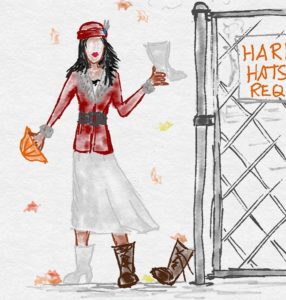
During the past few months, all of my available Underpinnings time has been consumed with work on a video for the DFI Women in Deep Foundations Committee to educate women and girls about our field. Every bit of my “Go Team!” energy has been focused on that effort, so blog posts have been moved to the side. Until last week.
I happened to be scrolling through news headlines on my phone while sitting through a particularly painful meeting when I spotted a story about actor Ryan Phillippe’s court case. The headline mentioned something about ex-wife Reese Witherspoon being drug into the mess, and I immediately went from zero to furious, assuming his turmoil was unfairly spilling over onto someone who had managed to pull herself out of his dysfunctional orbit. What I found had nothing to do with Witherspoon but made me even madder.
The gist of the saga is that Phillippe and an ex-girlfriend both claim the other engaged in harassing behavior. Text messages were brought in as evidence. One of Phillippe’s messages to his then-girlfriend was listed in the article as,
“…you’re too great as you are bb. you’re so smart and funny and complicated and damaged, and stunningly beautiful – all traits i find the most engaging and attractive.”
And that’s where I went through the roof.
Have you noticed the use of the word “damaged” in our current culture? It is often brought up in book reviews and synopses, describing the heroine of a touching memoir or the main character in a dark romance. “This book explores how the damaged, fragile young artist finds her way back to creating a real relationship after she thinks she has lost all hope,” – or some such nonsense. Movies capitalize on the idea, sometimes even working the word “damaged” into exposition.
Have you also noticed that the same word is rarely used to describe a man? No, damaged is all about women. It’s an expression conveying tragedy or heartbreak or mistakes that somehow have managed to ruin the main character. But ruined for what? What does damaged actually mean? More importantly, why has the term become accepted as some sort of romantic asset?
The word damaged typically means that someone or something is no longer in perfect condition. To take it a step further, it conveys the idea that someone or something no longer works properly.
Either definition begs the question, “What is perfect? What is proper working condition for a human being?” To be more pointed about it, what is “undamaged” condition for a woman?
We all are aware of societal stereotypes regarding the “perfect” life for a woman. You grow up in a loving house and work hard to be an obedient, accomplished young lady. You develop into a well-behaved woman who maybe has a tasteful career or maybe doesn’t. You have several beautiful children with a fabulous man, and you spend every last lick of energy giving them perfect lives and telling the world how #blessed you are. You are upheld as a paragon of selflessness and good sense, and you are told that you are beautiful when you spend what little time you have for yourself on getting your hair and nails done in whatever is the currently-accepted fashion.
So what constitutes damaged? Based on my study of current books and movies using the term, damaged involves a woman who made a bad decision and took a turn off that “perfect” life route. Damaged includes women who have dealt with emotional problems and diseases like addiction. Damaged includes women who have been victims of other people’s problems, women who have been beaten and oppressed and ignored. Damaged also covers women who have made a decision that led to problems, even when those problems weren’t of their own making. Damaged is anything beyond “perfect.”
Wait – isn’t that just life? Isn’t life all about making mistakes and learning from them? Aren’t we supposed to mature and evolve and get smarter as we get older? You don’t do that by sitting in a bubble and conducting a faultless life unscathed by reality.
Somehow we reached 2019 and we have managed to hang onto the term “damaged” to describe women who have strayed from some outdated norm. Let’s face it – the label is actually a shortened version of the term “damaged goods,” a phrase that used to pertain to women who were unmarriageable because they weren’t virgins. Even if they were the victims of horrible crimes, they were considered soiled and unworthy of a respectable match. So they were tossed out as defective, basically useless in polite society.
We have to be the advocates who reinforce the idea that women can make mistakes and have problems, just like men, and that doesn’t make them damaged. Furthermore, we can take paths in life that are not exactly like the #blessed route AND THAT’S OKAY. That woman who struggled with insecurity in high school and developed an eating disorder? She has learned to deal with her issues, and she is strong now. The girl you knew who misunderstood the jackass she married and found out too late that he settled arguments with his fists? Her scars are proof that she survived, and she can handle anything you throw at her now in your high stress work environment. And your old friend who wandered between majors in college and “lost” 10 years figuring out what she wanted to be? She probably knows more about herself than the average bear and will navigate the rest of her life with a clear vision. And that woman you know through work who unknowingly married an alcoholic and finally divorced him, only to marry another control freak because she had lost all perspective on what a good relationship was? Well, that’s me, and I’m just fine now. My life probably hasn’t looked like yours, but I’ve learned a lot and I have a life full of outstanding people.
The more sinister side of acceptance of the “damaged” label is the cultural use that is disguised as a romantic tribute by men who are actually hoping to control the woman in question. They act as though a “damaged” woman is more complex. Phillippe composed his text ode to his girlfriend as if he were saying how wonderful she was. But by calling her damaged, he was inferring that she was less than perfect. Men that use the term in this passive-aggressive way intend to reduce a woman’s confidence by reinforcing her imperfections, even if they profess to love those same flaws. It’s an insidious, degrading tactic that is anything but romantic. And books and movies that employ the same technique are no better. We must push back against this. Enough with calling the interesting movie heroines “damaged.” Has anyone ever called Batman damaged? No, he’s just dark, which is exciting.
The basic problem with the use of this word is that it implies that someone is not perfect. And that idea suggests that perfection is not just attainable but quantifiable. We, as women of 2019, should be able to just live and work and play and love. Perfection should not be a goal. Someone else’s idea of perfection should be something to avoid. And using someone else’s idea of perfection as a weapon for control should be a crime.
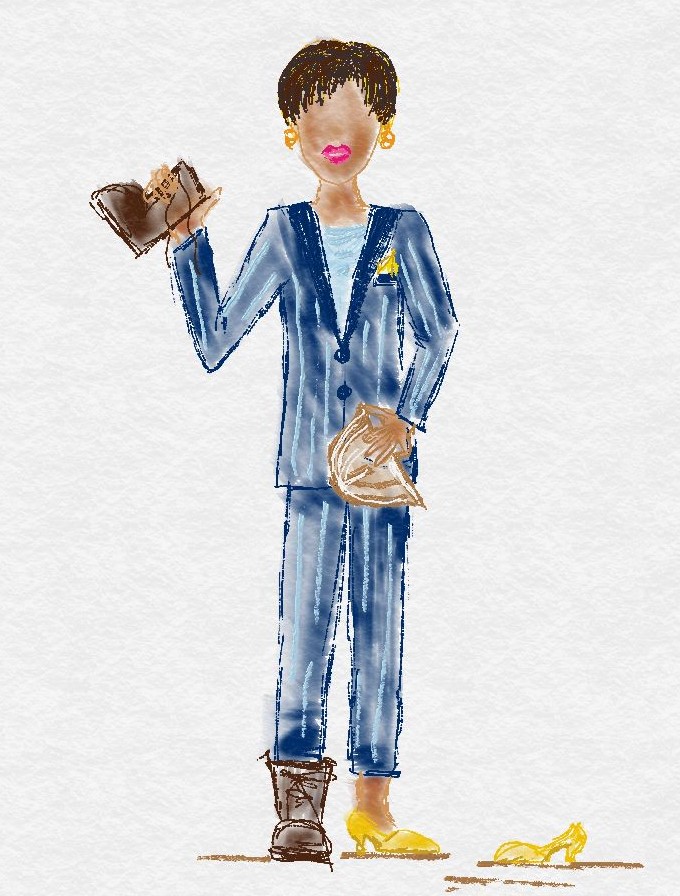
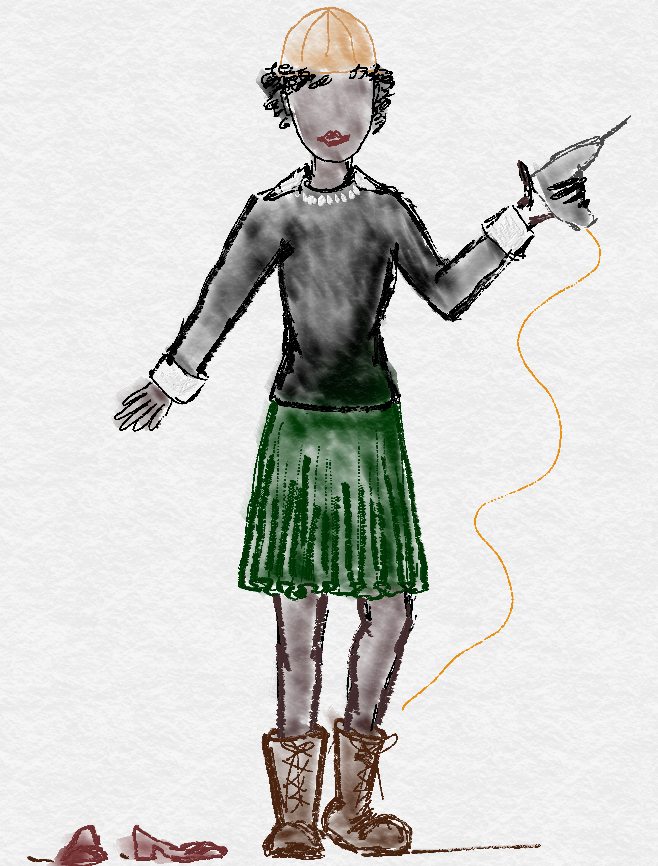
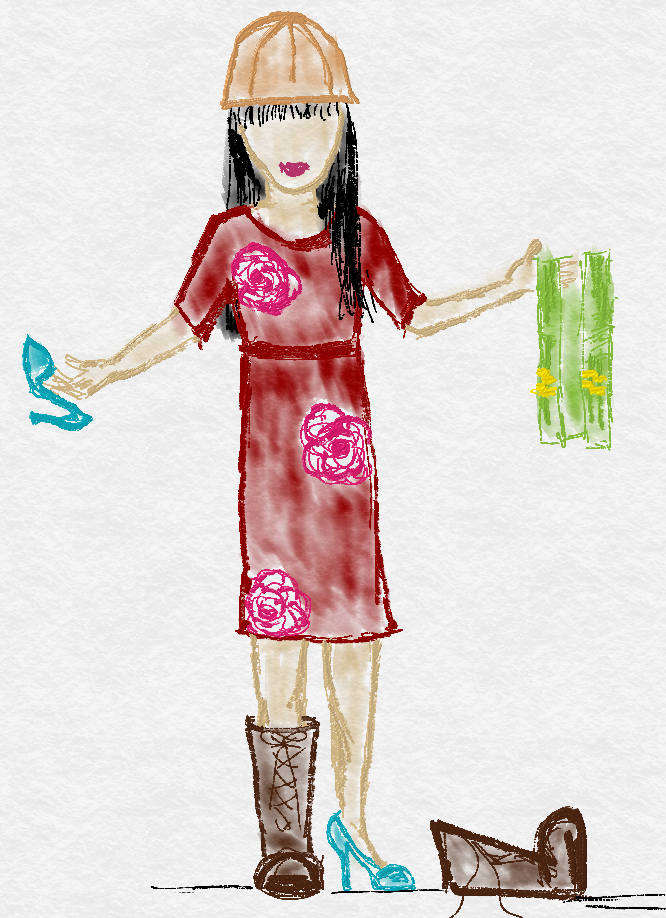
love it! this was so “on point”! coming from minority background, i have seen “white men” being very confused when…